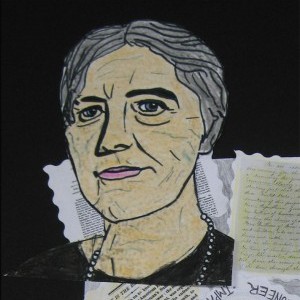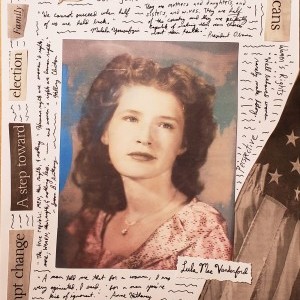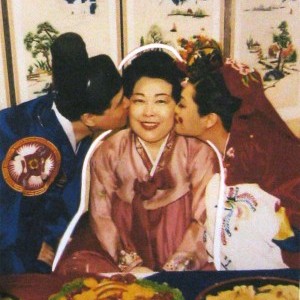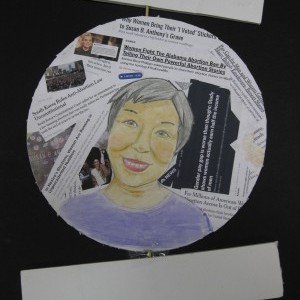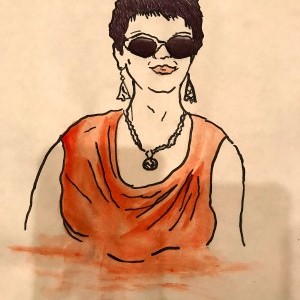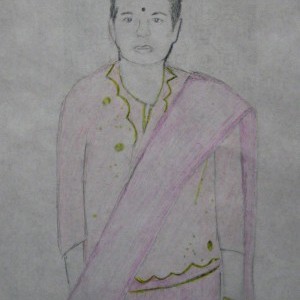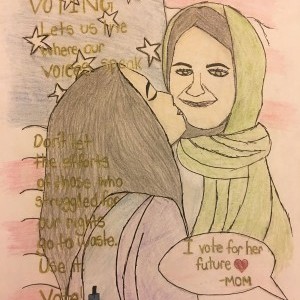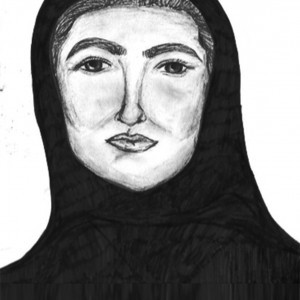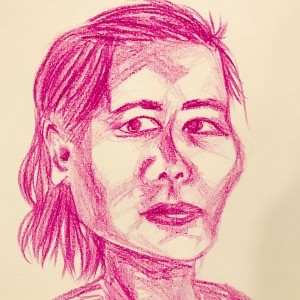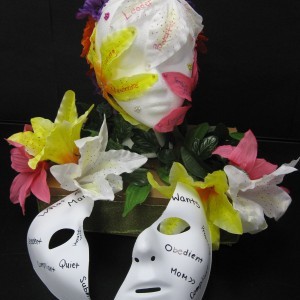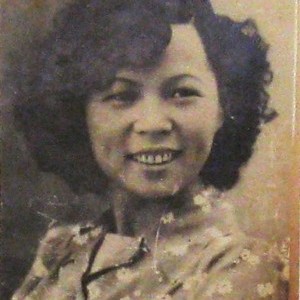Jennifer Moran, Adebola Ademola, Julia Hong, Vicki Kanellopoulos, Inga Kulma, Maimunah Virk, Deborah Molina & Kailey Van
Townsend Harris High School | Flushing, NY | 11th Grade
Inspirational Family Member
My Sister
Born to a pair of undocumented Salvadoran immigrants, a young girl would become the first woman and individual in my family to cast a ballot. She was fortunate enough to have been born in the United States, granting her the opportunities of an American citizen that her parents were deprived of due to their immigration statuses. She also found fortune having been born multiple decades after the ratification of the 19th Amendment; women who weren’t offered the same rights fought so that she could have it years later.
Though she made no effort to gain the right to vote, she didn’t take it for granted either. Her family and community inspired her to go to the polls. Deportations were a looming thought. Growing up in fear of seeing her family separated and never seeing her parents again haunted her childhood memories. While the political climate shifted during her adolescence, the success of a presidential campaign threatened her peace. Her course of action, therefore, was to vote and support a candidate that would protect her loved ones.
My sister, only older by shy of three years, was the first woman to vote in my family. Her background is very much similar to mine, being raised together in the same household. We hold similar views on the current administration and its comprehensive immigration policies, but her experience is far more intense than mine. While I have no memory of this time period, my sister recalls the unsettling threat of Bush era legislation like the Sensenbrenner Bill, the possibility of our then-undocumented parents losing their jobs or their places in this country. Seeing anti-immigrant sentiment rise once again in 2016 encouraged her to exercise her right to vote and inspired me to do so one day as well.
Though she was never denied the right to vote and was born into the rights she has, she didn’t miss her chance to vote; she considered what efforts of the past have gifted her and took great advantage of it.
Historical Figure I Admire
Alexandra Kollontai
Not many have heard or celebrate the name Alexandra Mikhailovna Kollontai, but she is an immensely important character in history when it comes to women’s rights. She was born in 1872, Saint Petersburg, 45 years before the start of the Russian Revolution. With her father being a general in the Imperial Russian Army, Alexandra lived a comfortable and privileged life until she joined the Russian Social-Democratic Workers’ Party and began advocating for women’s rights.
Why abandon her good social position you ask? Well, as a selfless woman, Kollontai wanted to help her sisters not live a life based off traditions, but of free choice and to be judged by the same social standards as men. Shura, was her childhood nickname given to her by her father, to whom she was very close. They both shared their interest in history and politics. She had a more complicated relationship with her mother, on the other hand. It was loving, but more demanding, as her mother, named Alexandra, and her nanny, raised her to be the traditional woman with good manners and skills in household duties. Kollontai, always having been a good student, wanted to pursue university schooling but her mother forbid it saying women weren’t in need of higher education. At 19 she met her future husband for the first time, and her mother, expectedly, disapproved of the potential spouse as he came from a poor background. Alexandra offered to work as a teacher when she heard her mother’s disapproval about his low income but that just angered her mother more, expecting her daughter to be a stay-at-home wife. All in all, Kollontai was fed up with the constant limitations when it came to her life as a woman, and dedicated her life to political change.
In 1920 she was in charge of the women’s section of the communist party and focused on women’s emancipation in Russia. Her time working in the revolution as a communist cabinet member motivated Kollontai to fight for issues women and children faced. She was a leader in women’s rights and expression in communication with men. She believed that women do not need men to be complete and that they should be socially independent and equal to men. In addition, Kollontai encouraged women to take charge of their rights and knowledge and that for their children too. Unfortunately, Kollontai faced opposition while advocating. Her strong and persistent ideals led to disputes between males and she eventually stepped down from her position.
In October 1922, Kollontai became the first woman ambassadress to Norway, where she worked on trade relations between Russia and Norway. She had this title for three years. Kollontai having this position was a major step forward for women by showing that they could hold important positions. She became a symbol of the power that women could hold in legislation. Alexandra Kollontai died on March 9, 1952. She lived a life of not settling for what society asked of women, but instead fought for the rights of women to thrive in society. She was a very hardworking feminist of her time and left a legacy of supporting the working class, as well as women in realizing their rights.
SOURCES +
What the Project Means to Me
Understanding the stories of the women before us is essential. Their accounts not only give us the chance to grasp the difficulties they were faced with, but they also inspire us to continue working on current inequalities. Researching these women also demonstrated to us the incredible capabilities women have always held throughout history, despite often being overlooked.
This project served to showcase these overlooked stories, and we were glad to be a part of it by highlighting the accomplishments of Alexandra Kollontai. However, not all the incredible stories of our world’s women are recorded. We must also take into consideration our own grandmothers, great-grandmothers, and so on when we think of the progress in women’s rights. They were also part of this history, and can offer us unique perspectives through first hand experiences. Through more in depth conversation, we can get to learn how vital they consider their voting right. These connections are valuable, because these individual stories help us improve our understanding of the bigger picture. Many today might take their right to vote for granted, but listening to the stories of family members who didn’t always have such privilege can show us how impacting this right truly is.
Citizens must have the opportunity to be influential in their own country, and should have a say in who’s making its major decisions. The opportunities that are present in our communities help us grow socially, mentally, and academically from a young age. They are the ones we are first introduced to, and the conditions we live in can either help us move forward or restrain us. Voting at a local level is how we can influence the direction of our community, as it can affect its level of safety, the quality of local schools, and more. Similarly, state election results can lead to better public transportation, better state-wide opportunities, etc. At the federal level, voting can impact not only someone’s community and state, but also influence changes internationally. Taking away someone’s right to vote is equivalent to stripping them of their independence and labeling their voice as insignificant.
Explore the Archive
More From This Class
Click on the thumbnails below to view each student's work.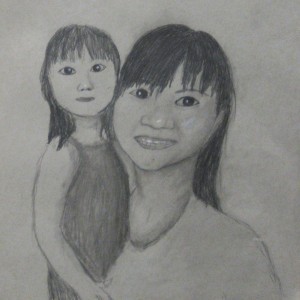
Vivian Chen, Josephine Chen, Ivan Chan, Zafirah Rahman, Neeharika Reddy, Daniel Shi, Daniel Shi, Jacqueline Cho & Osiris Guerrero
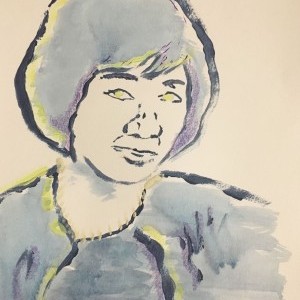
Kristina Chang, Sarah Chowdhury, Bethany Leung, Letian Fang, Cathy Choo, Kelly Chan, Emily Tan, Adamary Felipe & Kenney Son




